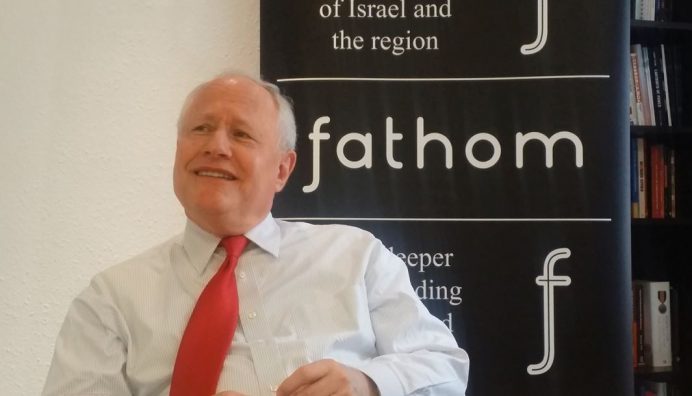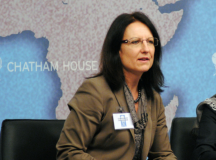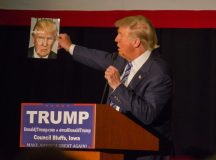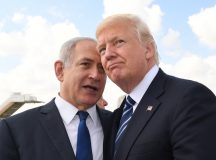William Kristol is the founder and editor at large of the influential US political magazine The Weekly Standard. In 2008 he served as foreign policy advisor for Senator John McCain’s presidential campaign. Addressing a Fathom Forum in London on 9 November 2017 Kristol set out this thinking about the continuities of US foreign policy under President Obama and President Trump – a man he recently described as ‘an irresponsible populist demagogue stoking grievances and dividing the country’. Below is an edited transcript of his remarks and the subsequent discussion.
Obama, Trump and Israel
Although his policy was not ‘anti-Israel,’ President Barack Obama had no deep fondness for Israel, nor any instinctive association with it, unlike many of his Democratic and Republican predecessors. Had you asked him in 2008, he probably would have said that his great hope was to be the ‘Harry Truman’ of the Palestinians – in 1948 Truman famously said that he was a modern day Cyrus helping the Jews return to their land – who would fulfill the hope of a two-state solution, rectify the injustices that were done to the Palestinians, and establish lasting peace between Israel and a Palestinian state. There’s nothing wrong with that dream, and most people would be very happy if it could be achieved.
Obama thought that Prime Minister Benjamin Netanyahu wasn’t making it easy for him to have a good shot at setting up a Palestinian state, and there were clashes early on. Obama emphasised the ‘distance’ between US and Israel (whereas George W. Bush had boasted of the opposite). Maybe Netanyahu didn’t always make things as easy as he could have; but no Israeli prime minister would have made a difference under those circumstances. There was no one on either side willing to do what the Obama administration thought was necessary for peace, and even if they had, it wouldn’t have brought peace any more than Oslo did. We’re not in that world anymore, and if you’re part of the pro-Israel community in the US, that’s a relief.
There is not that much of a story to tell about the Trump administration with respect to Israel and to the Palestinians. President Donald Trump would like to broker a deal between the Israelis and the Palestinians – that’s what he thinks he’s good at – but there’s probably no real deal to be had under the current circumstances. Trump is friendly to Israel – and is better disposed to it than his predecessor – but he also doesn’t have a deep attachment to the state. I don’t think he’s thought through what it would actually take to get to a deal. There are efforts underway; he sent his son-in-law Jared Kushner and lead negotiator Jason Greenblatt to the Middle East several times, and his close associate David Friedman is now Ambassador to Israel. The team is being responsible, seeing what can be done, but they are not forcing something that cannot be forced.
Israel is doing well economically, and the West Bank is quiet for most of the time. It’s not ultimately sustainable the way it is, but it’s been sustainable for a long time, and it’ll be sustainable for another few years.
Taking a broader view, while Trump’s ‘American First’ rhetoric sounds like the opposite of Obama, in practice Trump is continuing Obama’s retreat from the world, just in a different way. Trump’s ‘America First’ policy is nationalist and somewhat isolationist, while Obama’s foreign policy was that America should do less unilaterally, become more internationalist and not throw its weight around. Both agree that America should retreat, not get involved in conflict in the Middle East, and both view nation-building as too difficult. Trump really hasn’t done much to reverse what I regard as Obama’s terribly failed policies, in particular in Syria.
Obama’s failure in Syria
One of Obama’s major mistakes was his failure to act upon his own red line of gas attacks in Syria. It really did shake people’s confidence regarding the reliability of the US in terms of its commitments. I was in Japan about three months after Obama backed off from his own red line, and Prime Minister Abe asked me, ‘What happened there?’ I found myself in the slightly bizarre position of defending the Obama administration, explaining that things weren’t as bad as they appeared. It’s not like people in one part of the world don’t see what’s happening in another part. Statements and decisions by US presidents have repercussions.
The civil war in Syria has also destabilised Europe. One wonders if things would have turned out differently had German Chancellor Angela Merkel not made the decision in 2015 to take in a million refugees. If that doesn’t happen, Brexit doesn’t happen, and Donald Trump doesn’t become president. It’s also a disgrace that the Syrian civil war has taken half a million lives. This was not inevitable, nor was it a natural disaster. The war is not just a humanitarian and moral problem, but a real political problem which no one has the stomach to do much about. There are a few people in Congress, such as the old fashioned interventionist Republicans like John McCain who still speak up and say that we should be doing something. A few on the Left do too, but the Trump administration has no real stomach for it, and the Obama administration obviously didn’t either. That’s bad for the world, for the region, and it’s caused problems for Israel.
The loss of confidence in the US under Obama was also serious, especially during his second term. Analysts don’t distinguish enough between the two terms. The first term of Gates, Panetta, Clinton and Petraeus was a more traditional Democratic foreign policy. Foreign policy during the second term could be characterised as avoiding doing anything harmful. On top of Syria, Putin invaded Ukraine in February 2014 but we – and Europe – did nothing; China started testing in the South China Sea with the islands and we did nothing. People all over looked at us and said, ‘We won’t push too hard but if we act in a kind of “salami slicing” way, we can get away with a lot.’
To be fair to Trump, he inherited a tough situation. Even my preferred candidate, Senator Rubio, would have had a tough time. American defences were weakened and our credibility isn’t what it once was. A lot of work would have had to be done to rebuild US power.
Trump and Iran
Trump’s lack of a foreign policy strategy is already resulting in dangerous consequences. Iran is stronger than ever. If you’re a hawk like me, you didn’t like the Iran Deal, (I believed it signalled to the region that Iran is dominant) and it’s unfortunate that Iran has not moderated at all. Instead Iran has exerted itself more in Lebanon, Syria and Iraq and throughout the region.
The US should make clear that we are willing to do a lot of things to prevent Iran’s influence growing. We should send the message that it can be pushed back. We don’t, partly because of the focus on ISIS. We’re a bit too willing to cheer on Bashar al-Assad for that goal. To be fair to the Trump administration, the Syrian situation is very hard to deal with now; it’s not the same situation as it was in 2011, and even then it was complicated. Trump has sounded tough on Iran, which was heartening, but there hasn’t been much follow through. I strongly believe that Iran needs to be confronted on the ground in Lebanon, Iraq and Syria, though that does not necessarily mean US troops. If you’re not serious about that, then pushing back on the nuclear deal becomes less meaningful.
Trump has correctly triggered an internal congressional review of the Iran deal, which could lead to a decision to re-impose some sanctions and could lead to breaking up the deal. Yet it’s very unclear whether the Trump administration has thought this through, or if it has a real strategy if the agreement is nixed. According to high-level sources here in the UK, there’s been no serious consultation with allies about how we will go ahead. Some of the allies, especially the French, are open to renegotiating aspects of the deal; but I have no great confidence in the Trump administration’s ability to do this.
The future of the international order
Our liberal order has a more institutional weight and historical heft than people give it credit for. Yes, there have been setbacks, and a lot of governments, including the US, have made mistakes; but we’ve had a pretty good run for 70-75 years and the international order is a lot better than people thought it would be back in 1945. This includes a cold peace in East Asia for the last 45-50 years, which has witnessed steady economic progress, creating some problems for the US in terms of competition, cheap labour. But it’s been an unbelievable advance in world history to have billions of people no longer living on the verge of starvation. We don’t take enough pride in that.
Domestically, American institutions are pretty strong. With the separation of powers, the Supreme Court, the media, civil society, we have institutions that limit what damage the president can do. However, my fear of America under Trump – which is compounded by the preceding eight years under Obama – is that the international world order is more fragile than people think. There has been a further erosion of US power in the international order under Trump. The big question, that no one knows the answer to, is how much stress and strain the system can take, and what US neglect and US irresponsibility can trigger.
Maybe we’ll be speaking again in twenty years and the world will still look as it does – NATO will still be NATO, the Middle East will still be a war zone, Israel and Palestine will still be having their nth meeting about relieving checkpoints a little bit more, the Asian alliance will still endure, and China will still be constrained and not too irresponsible. That’s all possible.
But you never know what will trigger seismic events or what straw, to use a cliché, breaks which camel’s back. There is an awful lot of events in the Middle East right now that seem to be one or two steps from spinning out of control, which is not a desirable position to be in. There is now an attempt by the Crown Prince of Saudi Arabia, under the umbrella of his father the King, to change what has been a patriarchal monarchy, with a bunch of families controlling parts of the government, into a modern state. History suggests that these transitions are not as easy to pull off as people think.
To make matters worse, the rest of the world are really worried that the US won’t notice until it’s a day too late. For all of Trump’s talk, we’re basically following an incompetent version of a traditional foreign policy, staggering into events instead of shaping them in a more purposeful way. McMaster, Mattis and others have kept things from going off the rails.
Q&A
Question 1: Do you think the Iran nuclear deal should be axed?
William Kristol: President Obama did not submit the Joint Comprehensive Plan of Action (JCPoA) to US Congress, meaning that it doesn’t have international treaty status. We do have this mechanism where Congress has the right to disapprove it, which they did last month. President Trump not certifying Iran’s compliance with the accord has been taken completely out of proportion. If a president signs an executive agreement in one administration it doesn’t mean the next president cannot revisit that agreement. For example, President Bush and Prime Minister Sharon signed a letter in 2004 on settlements, before Sharon went ahead with the disengagement of Gaza. Obama didn’t agree with it so he rescinded it.
So I’m sympathetic with revisiting the JCPoA, but it is a little more complicated than just cancelling it. There are international powers as part of the nuclear agreement with whom we should consult with. While we wouldn’t necessarily be constrained by them, it is very helpful to have international cooperation on sanctions. (One of the very worst things about the JCPoA is that it gave away a very impressive international sanctions regime for what I would say were pretty minimal concessions.) The agreement is frontloaded to help the Iranians and it is now unclear what a US withdrawal of the agreement would actually mean. What would happen next? The Iranians would say they are able to go ahead with reaching nuclear-breakout capability as soon as they want, but we have other tools to exercise to make them think twice about doing so. Ultimately, President Trump has to decide whether the US is serious about confronting Iran or not and whether it will make Iran pay a price for its malign activities around the world or not.
I don’t object to Trump’s handling of the JCPoA, but it is important to say that, equally, I do not really see a policy or strategy to replace it. Obama had a strategy in the Middle East, in which Iran was central. In doing so, Obama changed traditional US bias in favour of the Sunni states towards placing his bets on Iran. I do not think it was a particular good judgement, but at least it was coherent. He also sacrificed a huge amount of leverage incidentally on behalf of the nuclear agreement in not confronting Iran over other areas.
Question 2: How much power does President Trump have over Middle Eastern Policy? Or perhaps to put the question differently, how do you rate Rex Tillerson’s role as Secretary of State? Or Secretary of Defence General Mattis, or National Security Advisor H.R. McMaster? How much power do they actually have to formulate policy or are they just trying to please Trump?
WK: Presidents are always the key when it comes to foreign policy decision-making. McMaster, Mattis and CIA Director Mike Pompeo do keep things on track, and they push Trump in certain directions, but you can’t have a real policy or strategy without the president signing off on it, articulating it, and selling it to other foreign leaders. I support Mattis and McMaster, but there’s little they can do. The good news is that Trump is not carrying out policies we feared the most at the start of his presidency, such as eliminating all trade treaties, pulling troops out of the Middle East, going to an America First foreign policy. NATO and the Trans-Pacific Partnership (TPP) still stand. The bad news is not much is being done to strengthen them and there’s a fair amount of neglect and low level chaos within the relationships. In countries where links aren’t as deep as they are with the UK, the risk is higher.
The US is a huge global power and under Bush and Obama you had the sense that people were really trying to do things, to push in certain directions, using leverage and persuading others. Now, we’re just watching things happen. McMaster would like to do more in the Middle East, he knows a lot about the area, and Mattis would like to check Iran. The whole thing is a bit adrift.
Question 3: Let’s talk about Russia. Sir John Jenkins spoke at a Fathom Forum last Friday and talked about how just as Iran is winning in the Middle East vis-a-vis Saudi Arabia, lots of people see Putin winning vis-a-vis Trump. I wondered if you had any thoughts on that relationship and where it may lead in the next year or so. And, is Russia going to stay in the Middle East long-term, and is it going to be something we may have to confront?
WK: They are there in a big way. If 20 years ago someone said Russia would be involved in Syria and everyone’s fine with it, I would have said, ‘Are you kidding?’ It was a major accomplishment to get Russia out of the Middle East and deter them from the notion that they can use force there. China is also present in the Middle East but its situation and Russia’s are different. Russia is weak; it’s not exactly a flourishing nation. Putin is a tough, shrewd guy who has managed to throw his way around, intimidating a lot of people without much push back. It’s worked in the Middle East and Europe, and he hasn’t paid a price for interfering with our (US) election. It is worrisome, but I don’t think it’s as worrisome as it could be because Russia is not as powerful as the Soviet Union once was.
China is different. They do have a strategy, and they have a bigger, more stable regime that is soon to be wealthier. Objectively, Russian President Vladimir Putin, Chinese President Xi and Iranian Supreme Leader Khomeini are stronger than they were five years ago, and we’re weaker. Maybe some of that was inevitable; China is a big country that will get stronger over the next decade. In Eastern Europe, Russia has been funding parties on the Left and Right that are semi anti-democratic. It seems that the vision of a ‘Europe whole and free’ is fraying at the edges and you don’t know which one or two things more could provoke a very bad situation.




































